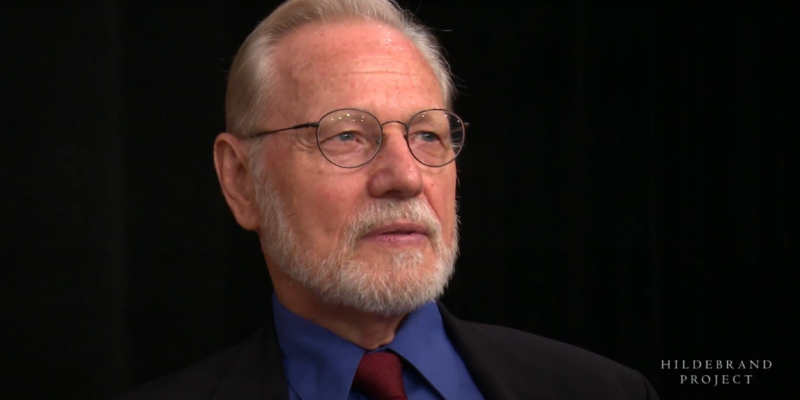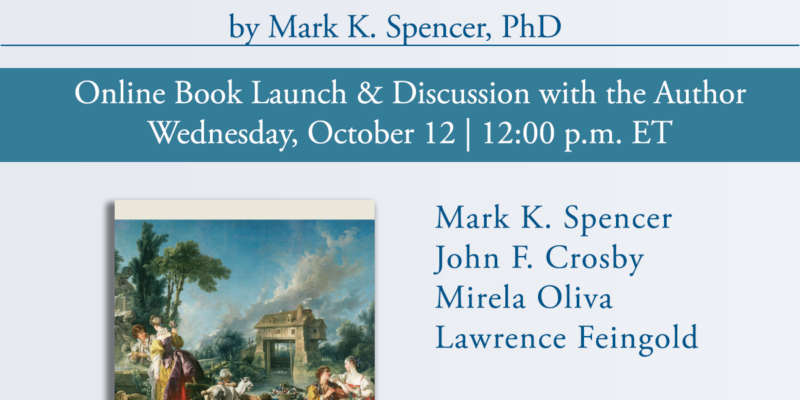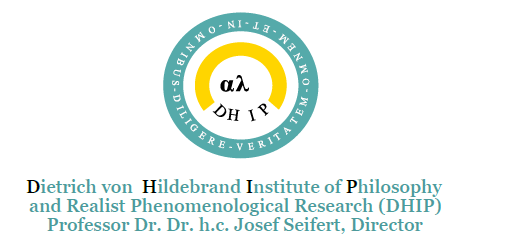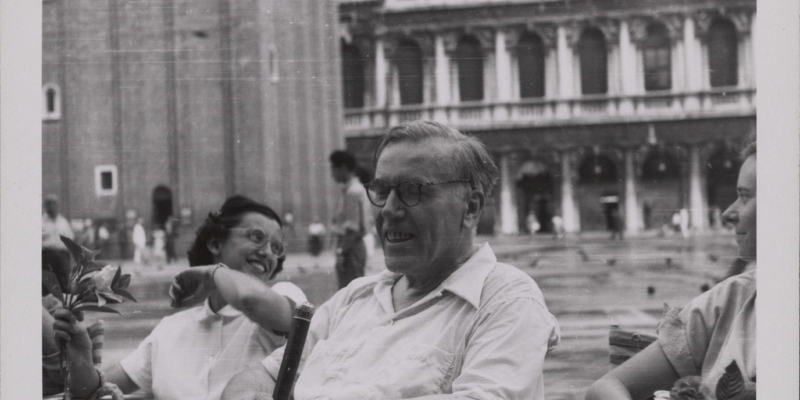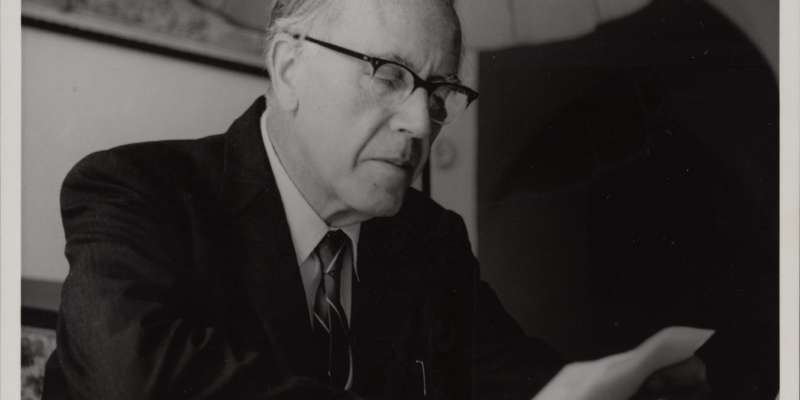It has been seven years since the Hildebrand Project has held an event in Europe. We are thrilled to announce our return to Europe for our 2025 Residency, June 12-18!
Dr. Robert E. Wood Tribute
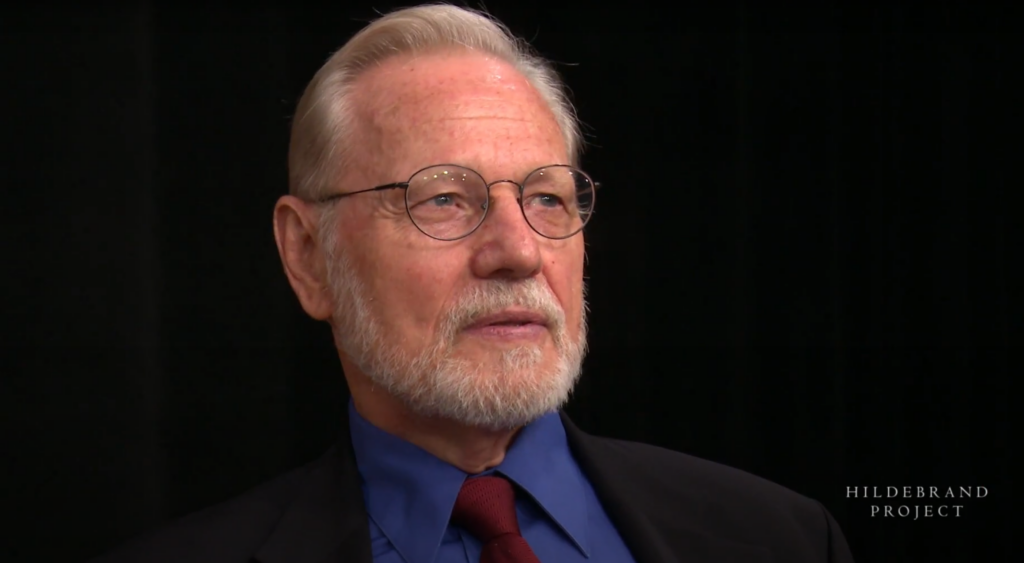
By Christopher T. Haley
Student of Dr. Wood and Vice President of the Hildbrand Project.
The Hildebrand Project mourns the passing of Dr. Robert E. Wood (October 20, 1934 – February 10, 2023). Dr. Wood was a longtime friend and colleague of Hildebrand Project co-founder Dr. John F. Crosby and he was my teacher at the University of Dallas. Indeed, it was Dr. Wood who suggested I seek out the Hildebrand Project nearly a dozen years ago—little did I know (though I believe he knew) that he was setting me on my life’s course.
Dr. Wood was a Renaissance man, a scholar, an athlete, a sculptor, and a philosopher in the Platonic sense: a musical man of ordered harmony. He wrote on all the great philosophers, but he had a special love for Plato. I still recall coming into his office one day to find him reading Plato’s Meno, a text he must have read dozens of times and certainly didn’t need to re-read. He wasn’t teaching the book anytime soon or writing on it; he was just enjoying it. Dr. Wood always said: “There is no reading; only re-reading.” Despite his prolific output and many accolades (you may read his obituary here), he was always a student; and to be his student was to be a student with him, to join him on a journey through great ideas and the untold beauty of the world. He was a Virgil to his students.
We called him “the maestro” on account of the way he would conduct his classes. He held whole philosophical systems in his repertoire, and could bring them to vision before your eyes and mind. Whatever he taught, he wanted to convey its beauty. He was like St. Thomas in always giving every position its most charitable and compelling account. That intellectual charity is one of the most important lessons I learned from him. Try as I might to dismiss a thinker (usually Hume), he would urge me to understand why we read this and to find what is best and important (even in Hume!).
He showed this same charity to his students too, finding what was best in their work and in them as persons. I once wrote a paper on Kant; I received it back with a “B” and a comment that it was a good paper on Plato! He was as interested in my love for poetry and my family as he was in my pursuit of philosophical studies. At the heart of Dr. Wood’s interest was the core of the person, the “inner heart,” as he used to say. The influence of Dietrich von Hildebrand is evident; and, while I never studied Hildebrand with Dr. Wood, he would often refer to The Heart and Liturgy and Personality as being two of the most important books in his philosophical formation.
It was thus a personal and professional joy for me to invite him to author an introduction to Hildebrand’s Aesthetics, and to host him as a speaker for our 2017 summer seminar on Retrieving Beauty (the videos are available here). His last publication, just a month before he died, was Being Human: Philosophical Anthropology through Phenomenology and he was still at work on his last book, fittingly, a book on the heart.
A friend, a mentor, a student, and a scholar; a family man, a faithful man, and a gentleman; we have lost a truly great person and a refulgent personality in Dr. Wood. His legacy lives on in his beautiful family, his myriad students, his enduring impact on Catholic philosophy, the University of Dallas community, and, in some small way, in the Hildebrand Project.
Dr. Wood thought we should all sing more, particularly at the end of events and gatherings. I thus invite you to join us in your hearts in singing:
Salve, Regina, Mater misericordiæ,
vita, dulcedo, et spes nostra, salve.
Ad te clamamus exsules filii Hevæ,
Ad te suspiramus, gementes et flentes
in hac lacrimarum valle.
Eia, ergo, advocata nostra, illos tuos
misericordes oculos ad nos converte;
Et Jesum, benedictum fructum ventris tui,
nobis post hoc exsilium ostende.
O clemens, O pia, O dulcis Virgo Maria.
Ora pro nobis, sancta Dei Genitrix,
Ut digni efficiamur promissionibus Christi.
Dietrich von Hildebrand Institute for Philosophy and Realist Phenomenology Spring/Summer Semester
Led by Josef Seifert, the Dietrich von Hildebrand Institute for Philosophy and Realist Phenomenology (DHIP) offers advanced philosophy courses in-person and online.
The Spring/Summer lecture course Philosophie des Geistes — Mit Geist begins April 28 and runs through July 28. The Research Seminar begins on May 4.
See the welcome letter by Professor Seifert below for more information.
Summer Grants
The Hildebrand Project is pleased to accept applications for grants of $3,000 for writing projects in May-September 2022 on any theme in the thought of Dietrich von Hildebrand or in Christian personalism (including the work of Karol Wojtyła, Max Scheler, Edith Stein, Jacques Maritain, or philosophical ways of thinking stemming from these thinkers and thinkers related to them). Eligible projects include work such as an MA thesis, PhD dissertation, scholarly article, or book chapter. The purpose of the grant is to enable a period of focused engagement with Hildebrandian and personalist ideas resulting in new writing destined for publication.
You may request a grant for work this summer or through the end of 2022, meaning the grant report would not be due until January 2023.
Up to eight grants will be awarded.
Application Guidelines
- Graduate students and faculty in any field are welcome to apply.
- Please submit the following to info@hildebrandproject.org by May 8, 2022:
- 1-3 page proposal explaining the envisioned project, its philosophical import, and what the applicant hopes to achieve during the grant period
- Short proposed bibliography
- Academic CV or resume
- Grants are intended (1) to help stimulate new work or, if not entirely new work, (2) to make it significantly easier to pursue a given project. For this reason, a project already underway and reasonably likely to be completed without additional support would not be eligible for a grant. Note also that you can apply for less than $3,000.
- In your proposal, explain how the funding will meaningfully enable your work. For example:
- The grant frees you to work on your project by replacing income from summer teaching.
- The grant supports travel for research or to present at or attend a conference.
Awards
- Applications will be reviewed and selected by a committee of scholars in Christian personalism.
- All award decisions will be communicated by May 15, 2022. All decisions are final.
- Grantees are required to submit a report on the fruits of their work by January 2023.
- Grantees who publish their work in a scholarly journal within 18 months of September 30, 2022 will receive a $250 publication incentive. Work published in a non-peer reviewed outlet (e.g., First Things, Plough, Church Life Journal) within 12 months will receive $100. To claim a publication incentive, a grantee should submit to info@hildebrandproject.org a copy of the work as published or, if still pending, a brief note from the journal editor confirming imminent publication.
For questions or more information, please email the Hildebrand Project at info@hildebrandproject.org


